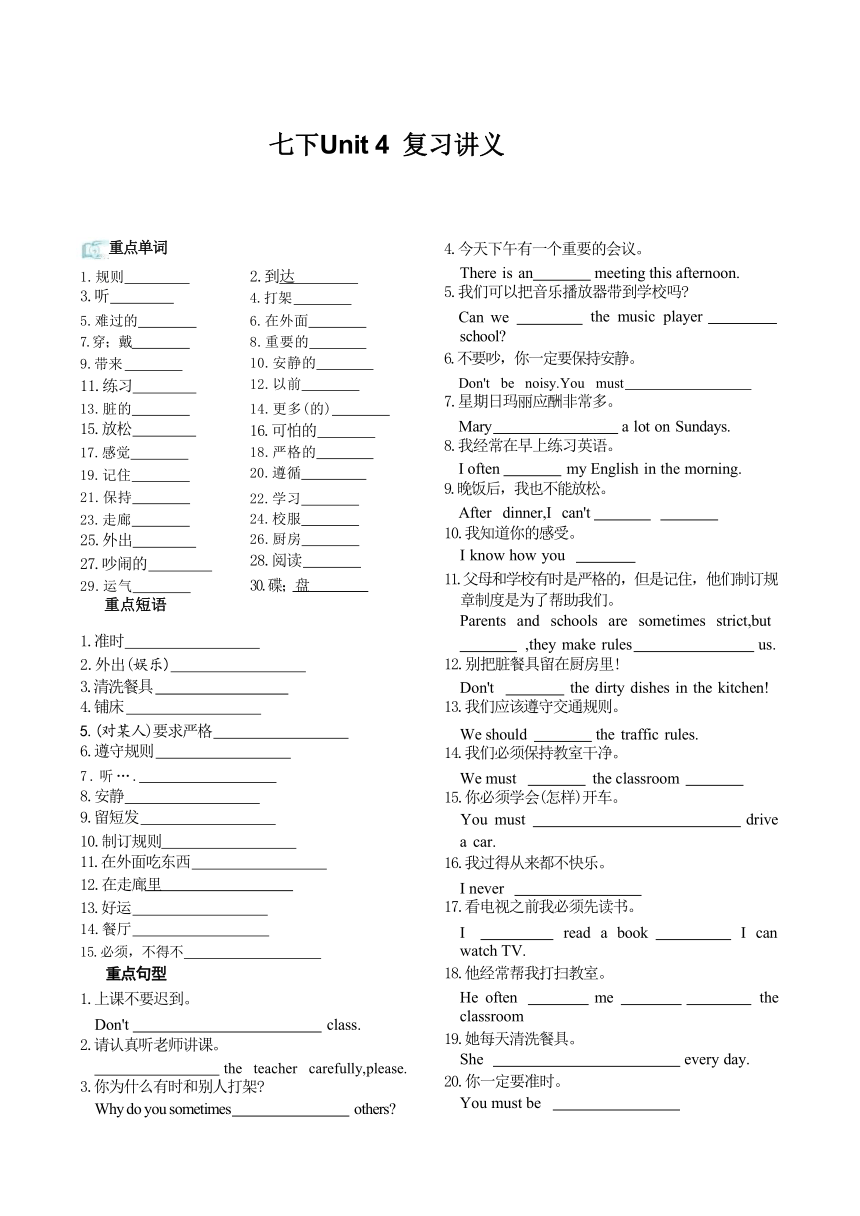
七下Unit 4 复习讲义 重点单词 1.规则 3.听 5.难过的 7.穿;戴 9.带来 11.练习 13.脏的 15.放松 17.感觉 19.记住 21.保持 23.走廊 25.外出 27.吵闹的 29.运气 重点短语 2.到达 4.打架 6.在外面 8.重要的 10.安静的 12.以前 14.更多(的) 16.可怕的 18.严格的 20.遵循 22.学习 24.校服 26.厨房 28.阅读 30.碟;盘 1.准时 2.外出(娱乐) 3.清洗餐具 4.铺床 5.(对某人)要求严格 6.遵守规则 7 . 听 … . 8.安静 9.留短发 10.制订规则 11.在外面吃东西 12.在走廊里 13.好运 14.餐厅 15.必须,不得不 重点句型 1.上课不要迟到。 Don't class. 2.请认真听老师讲课。 the teacher carefully,please. 3.你为什么有时和别人打架 Why do you sometimes others 4.今天下午有一个重要的会议。 There is an meeting this afternoon. 5.我们可以把音乐播放器带到学校吗 Can we the music player school 6.不要吵,你一定要保持安静。 Don't be noisy.You must 7.星期日玛丽应酬非常多。 Mary a lot on Sundays. 8.我经常在早上练习英语。 I often my English in the morning. 9.晚饭后,我也不能放松。 After dinner,I can't 10.我知道你的感受。 I know how you 11.父母和学校有时是严格的,但是记住,他们制订规 章制度是为了帮助我们。 Parents and schools are sometimes strict,but ,they make rules us. 12.别把脏餐具留在厨房里! Don't the dirty dishes in the kitchen! 13.我们应该遵守交通规则。 We should the traffic rules. 14.我们必须保持教室干净。 We must the classroom 15.你必须学会(怎样)开车。 You must drive a car. 16.我过得从来都不快乐。 I never 17.看电视之前我必须先读书。 I read a book I can watch TV. 18.他经常帮我打扫教室。 He often me the classroom 19.她每天清洗餐具。 She every day. 20.你一定要准时。 You must be 知识点4 重点语法 (一)祈使句 1.祈使句概说 用于表达命令、请求、劝告、警告、禁止等的句 子叫作祈使句。祈使句最常用于表达命令,祈使句 因对象(即主语)是第二人称,所以通常都省略主 语;祈使句为一般现在时,句末则使用句号或感叹 号来表示结束。 2.祈使句的形式 (1)肯定祈使句的表现形式: ①Do 型 :动词原形(十宾语)十其他. Have a seat here,please.请这边坐。 ②Be 型:Be+ 表语(名词或形容词)+其他. Be a good child! 要做一个好孩子。 ③Let 型 :Let+ 宾语十动词原形+其他. Let me help you.让我来帮你。 (2)否定祈使句的表现形式: ①Do 型和 Be 型的否定式都是在句首加 don't。 Don't forget me! 不要忘记我! Don't be late for school! 上学不要迟到! ②Let 型的否定式有两种:“Don't+let+ 宾 语 十动词原形十其他.”和“Let+ 宾 语 +not+ 动词原形+其他.”。 Don't let him go./Let him not go.别让他走。 ③有些可用no开头,用来表示禁止性的祈使句。 No smoking! 禁止吸烟! (二)情态动词 have to与 must 1.have to表示客观需要做的事情,意思是“必须,不 得不”。使用 have to时应注意的几点: (1)have to后接动词原形,意为“必须做……;不得 不做……”。 You have to wash my clothes first.你必须先 洗我的衣服。 (2)have to有人称、数和时态的变化,其第三人称 单数形式为hasto。 She has to help her mom make dinner.她不得 不帮她妈妈做晚饭。 (3)含有have to,has to的句子需分别借助助动词 do,does 构成疑问句或否定句。 Do they have to go home now 他们得现在回 家吗 You don't have to go there now. 你不必现在 去那儿。 2.must 的用法 (1)表示主观的义务和必要,主要用于肯定句和疑 问句,意思是“必须……,得……,要……”;由 must 引导的疑问句 ... ...
~~ 您好,已阅读到文档的结尾了 ~~

